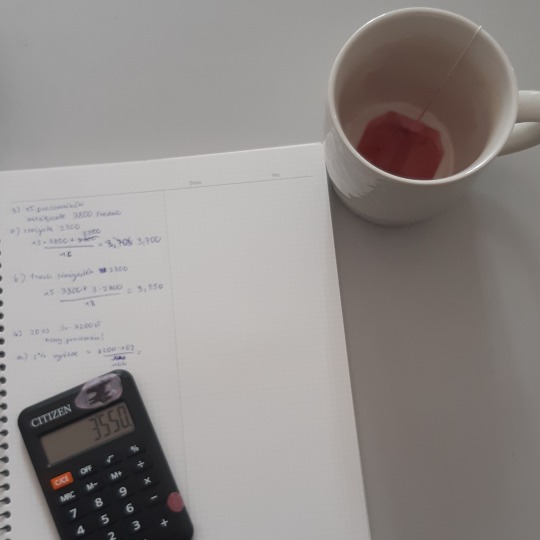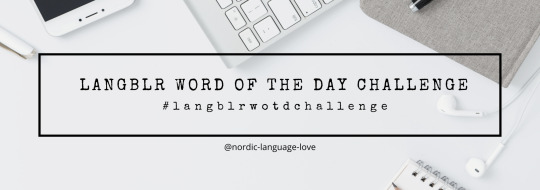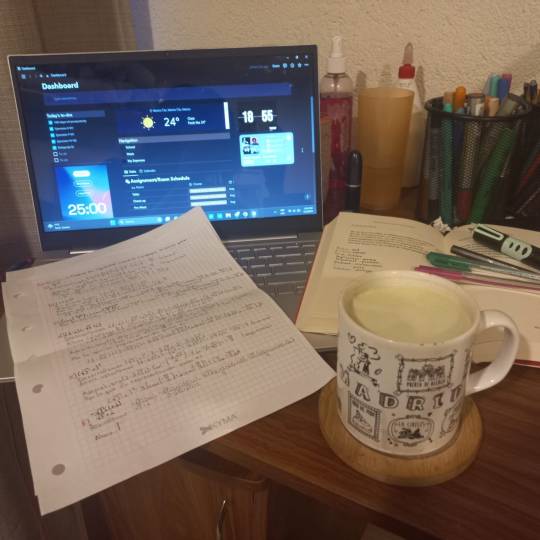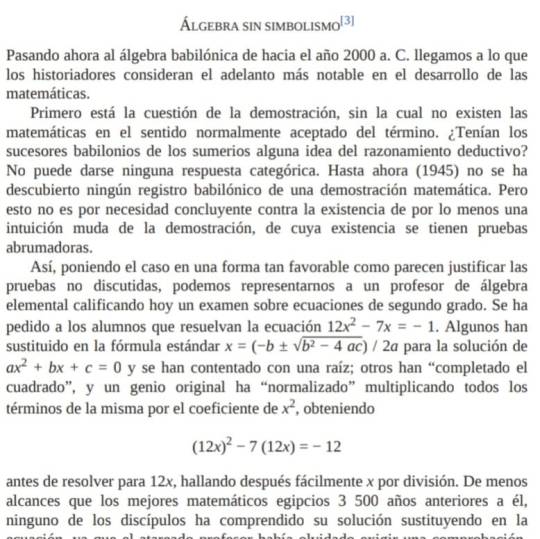#Langblr Word of the Day Challenge
Text
Langblr Word of the Day Challenge

Day 1: Rain
RUSSIAN: дождь 💧
Create a vocab list of at least 5 words based around the word
шторм / буря — storm ⛈️
потоп — deluge 🌧️
изморось / морось — drizzle 🌦️
град — hail 🌨️
снег — snow ❄️
облако — cloud ☁️
гром — thunder 🌩️
молния — lightning ⚡
небо — sky 🌌
- пасмурный — cloudy / overcast 🌫️
радуга — rainbow 🌈
зонт / зонтик — umbrella ☂️
Write a paragraph (or more) based around the word / one sentence containing the word
На вечер обещают дождь – возьми твой зонт!
#langblrwotdchallenge#Langblr Word of the Day Challenge#russian langblr#russian language#studyblr#study blog#uni student#uniblr#russian vocabulary#русский язык
70 notes
·
View notes
Text

🌸🌼🌸 30-Day Journey to Korean Language Mastery! 🌸🌼🌸
Hey there language lovers! Are you ready for an exciting adventure in learning Korean at a more intermediate level? 🇰🇷✨ In this 30-day study schedule, we'll dive into some juicy grammar topics that'll take your Korean skills to the next level. Ready to embark on this language adventure? Let's rock this 30-day challenge together! Happy studying and remember, every step counts on the road to Korean language mastery! 화이팅! 💪✨
Week 1: Verb Modification and Advanced Sentence Structures
Day 1: Time to dust off those honorifics and level up your respect game! Show some love to those verbs with various honorific verb endings.
Day 2-3: Let's express our wishes and assumptions with "았/었으면 좋겠다" (I wish I had) and "-(으)ㄹ 텐데" (I suppose, I think). Wishful thinking, here we come! 🌠
Day 4-5: No more doubts about "have to" or "can do"! Master "-아/어/여야 하다" (have to, must) and "-아/어/여도 되다" (can, may).
Day 6-7: Weave your magic into sentences with various verb modifications and advanced structures using the things you've studied the past few days.
Week 2: Subjunctive and Concessive Expressions
Day 8-9: Curiosity piqued? Delve into "-아/어/여 보다" (try to do) and "-아/어/여지다" (become something). Adventure awaits! 🚀
Day 10-11: Unveil the power of "even if" with "-더라도" and the allure of "either" with "-든지".
Day 12-13: Embrace "no matter how much someone says" with "아무리~-(으)라고 해도" and the certainty of "regardless of" with "-든간에".
Day 14: Take a deep breath and look back on the amazing grammar points we've conquered so far! You're soaring to new heights! 🦅
Week 3: Advanced Particles and Connectives
Day 15-16: Adventure calls! Set out on "-을 테니까" (since I will) and navigate "-느라고" (because of, due to).
Day 17-18: Embrace the twists and turns of "-를 지경이다" (to the extent of) and "-는바람에" (because of, on account of). The path may be challenging, but you're up for it!
Day 19-20: "Even if it's tough, let's do it!" Dive into "-아/어/여서라도" and "might have to do" with "-아/어/여야 할지도 모르다".
Day 21: Let's take a moment to bask in the glory of the grammar points we've mastered in Week 1 to Week 3. Proud language learners unite! 🌟
Week 4: Expressing Intention and Assumptions
Day 22-23: Master the art of expressing intentions with "기로 하다" (decide to do) and "으려던 참이다" (was about to do). Your plans are set in motion!
Day 24-25: Delve into assumptions with "ㄴ/는다고 하다" (heard that) and "ㄹ/을 것 같다" (seems like). The mystery unfolds! 🔍
Day 26-27: Let's get speculative with "것 같으면서" (while feeling like) and "(으)니까" (since, because). The intrigue continues! 🕵️♂️
Day 28: Embrace your linguistic prowess as you navigate the subtleties of intention and assumptions. Let's recap the past few days!
Week 5: Advanced Particles and Expressions
Day 29-30: Explore the nuances of "만에 하다" (to do after a long time) and "아니면서도" (although, even though). Time to fine-tune your expressions!
Day 31: Reflect on your incredible progress and pat yourself on the back for conquering advanced grammar structures. You've come so far, and there's no stopping you now! 🎉
#Learn#Learning#Language Learning#korean#studyblr#koreanblr#langblr#study#vocabulary#vocab#words#studying#Vocabulary#Vocab#Words#Practice#study challenge#30 day challenge#language
226 notes
·
View notes
Text
Monday 15th | 21/100 days of productivity₊ 。˚⊹


Revise French flashcards [5m]
Revise Japanese flashcards [5m]
Study for history test (4/3) [1h]
Listen to Japanese TV in the bg [30m]
Print mockup for paintings > got approved yay!
Finish making portfolio [10m]
Revise before English quiz, make flashcards [15m]
Read The Body Keeps The Score [30m]
Word of the day: to bloom; blossom -> flower bloomed
fr: fleurir [-ir verb] -> la fleur a fleuri
jp: 咲く [さく] -> 花が咲いた [はながさいた]
cn: 开花 [kāihuā] -> 花朵开花 [huāduǒ kāihuā]
nl: bloeien -> bloem bloeide
🎧₊ ˚⊹ raindrop city - lamp
#figured I'd do the word of the day if I have nothing to share lol#study blog#studyblr#study motivation#chaotic academia#100 days of productivity#100 days challenge#study#study tumblr#academic validation#academic weapon#langblr#french lang#french langblr#french language#japanese langblr#japanese language#languages#linguistics#mandarin#chinese#mandarin chinese#japanese#dutch#dutch language
34 notes
·
View notes
Text
Day 30!!
Манить (verb, imperf.) - to beckon
Тянуть (verb, imperf.) - to pull
Потемнеть (verb, perf.) - to darken
Сопротивляться (verb, imperf.) - to resist/struggle
Мысленно (adv.) - mentally
Угас (adj. I guess) - faded (away)
Награда (noun, f.) - reward
Азарта (noun, f.) - excitement
Перемен (noun, m.) - change/transformation
Жертвовать (verb, imperf.) - to sacrifice/donate
Нежный (adj.) - gentle
Страдать (verb, imperf.) - to suffer
Крыло (noun, n.) - wing
Излечить (verb, perf.) - to heal
Обезоружить (verb, perf.) - to disarm
Объятие (noun, n.) - embrace
Глубоко (adv.) - deeply
Сочинять (verb, imperf.) - to write/compose
Songs: Награда by Lusia Chebotina & Не надо быть сильной by Misha Marvin
#btw if words repeat themselves in these lists it’s because i still haven’t remembered them properly#and I think repetition is a good thing#langblr#langblog#learning russian#russian langblr#russian vocabulary#russian langblog#russian vocab#90 day vocab challenge
22 notes
·
View notes
Text
Masterlist Langblr challenges
Following from my previous posts, if you do feel like working on your languages, but don't know where to start; here are some langblr challenge you might like!
Language Blog Challenge: 20 weeks of challenges | by @lily-learns-finnish
Langblr Reactivation challenge | by @prepolyglot
14 Day langblr challenge | by @lass-uns-studieren
Langblr News challenge | by @tealingual
90-day vocab challenge | by @jibunstudies
100 Happy Days Langblr Challenge | by @nordic-language-love
Mini speaking challenge | by @nordic-language-love
16 words challenge | by @neblina-a-blin
30 day langblr challenge | @moltre-s
Brick-by-brick language learning challenge | by @linguistness
Langblr word of the day challenge | by @nordic-language-love
Target Language Reading challenge | by @onigiriforears
P.S. Please let me know if you know some more fun langblr challenges!
#language learning#swedish langblr#swedish#langblog#langblr#languages#swedish language#language resources#langblr challenge#language learning challenge
501 notes
·
View notes
Text
Langblr Reactivation Challenge
Hello everyone! As you may know I've created this challenge to help revive the langblr community. It's a three week challenge designed to get you back into learning languages and (hopefully) give you ideas on how to study and share your knowledge of them. It is completely optional to do, but try to reblog other people's posts if you aren't participating.
The challenge is designed to be done daily, however if you miss a day, you can go back and do it later or continue from where you left off. I do encourage you to do your best to keep up with the challenge though. Tag your posts with #langblr reactivation challenge so that others can find your posts.
If you have any questions, please send me an ask or a message and I'll do my best to answer it.
I'll put the prompts under a read more so this post isn't ridiculously long. Good luck to everyone participating! Remember the best way to promote the langblr revival is by reblogging other people's work.
Week 1
Day 1: Create an introduction post about yourself. What's your name? What languages are you studying? What languages do you hope to study? What do you hope you'll get out of this challenge? Add whatever else you’d like to your introduction post!
Day 2: Write a list of goals you have for your target languages. Make both long term and short term goals. An overall goal could be to have the ability to talk with native speakers with ease and a smaller goal would be to finally learn that difficult grammar point that's been plaguing you for ages. How will you achieve them?
Day 3: Create a list or a Mindmap of vocabulary topics. Start with a broad topic and narrow down to more specific topics. An example could be bedroom - furniture - closet - clothes or travelling - languages - study words - school supplies. Keep a hold of this because you'll use it later to create vocab to study. Some broad topics to start with: house, school, work, travelling, friends and family, nature, city. Feel free to use these or think of your own. Share your mindmap so others can get some ideas if they need it. Here are some mind map creation tools (x) (x) (x).
Day 4: Create a vocab list for one of the topics you created yesterday, if you want to make more, feel free to make as many as you like! Share your list and reblog other people's lists. And most importantly, make sure you study these words!
Day 5: Find a video in your target language and watch it as many times as you need to in order to understand it. Make a post about the video. What was it about? Did you like the video? Was it difficult to understand? Make sure you link the video. Try to write your answers in your target language, but if you can’t that’s okay!
Day 6: Look up 3 idioms in your target language and explain what they mean and how you use them in a sentence (with an example!).
Day 7: Send asks to other langblrs (bonus points if it's in a shared target language!) asking them about whatever (for example, ask how their day was, ask questions about their target languages, or share some of your thoughts with them). If you receive one, answer it! You can ask more than one person and it can be on or off anon.
Week 2
Day 1: Over the next week, create a playlist/playlists of songs in your target language(s), they can either have a specific mood or genre or they can be a collection of songs you've discovered. When you feel like you're done with your playlist, share it so others can find some new songs. If you already have a playlist, you can add songs to it and update it.
Day 2: Write an explanation on a grammar rule in your target language (such as verb tenses, exceptions, word order, etc). Include sentences to show how and when it is used.
Day 3: Either make a vocab list or find a vocab list you like and make sentences using those words. You can make them as long or as short as you like. This is a good way to contextualise vocab words and learn them in context. Share your sentences and highlight the vocab word.
Day 4: Record yourself reading an article, short story, or passage (basically anything written in your target language). Listen to it and see if you can point out any areas you can improve with your speaking and any areas that you're doing well. You can post your recording if you wish.
Day 5: Post at least 2 songs that you like in your target language. Make sure you add a link to them so people can go listen to them.
Day 6: Share a study tip you have. This can range from how you organize your notes to playlists that help you study to apps you use to review. Just something that you find makes studying easier (and more fun).
Day 7: Share with everyone some langblrs you enjoy seeing on your dash, try to put at least 5 people (and make sure you @ them!).
Week 3
Day 1: Remember that playlist you made/are making? Take a song you really like and make a vocab list of words you don't understand, learned from the song, or recognize but don't quite remember. Post so others can see and link the song. If you have extra time and/or want a bit more of a challenge, translate the song as well, either into English or another language.
Day 2: Write about a festival or holiday that is celebrated in a country that speaks your target language. This can be either something you’ve celebrated yourself, have wanted to participate in, or have never heard of before. You can write this in any language you’d like.
Day 3: Make another vocab list from the list you made at the beginning of the challenge. If you are learning two or more languages, make the vocab list in 3 languages (meaning for example: French, German, and English or Japanese, Arabic, and Ukrainian).
Day 4: Find a recipe written in your target language and translate it into your native language (or another language of your choice) or find a recipe in your native language and translate it into your target language. Bonus points if you actually make it (share pictures if you do)!
Day 5: Create a collection of resources you use to study/learn your target language. Add links to them if possible so others can also use them.
Day 6: Create a post explaining a grammar rule that you had/are having difficulties learning. If you’re currently having difficulties, do your best to explain and ask others to help you understand it better. Include example sentences in your explanation.
Day 7: How do you feel at the end of this challenge? Did you meet any goals while doing this? Do you feel more confident in your language abilities? Where do you think you'll go from here? Answer these questions either in your native language or your target language.
Hopefully you guys enjoy/enjoyed this challenge. After you've completed the challenge, I encourage you to continue your studies in your target languages and support others in theirs.
719 notes
·
View notes
Text
langblr challenge day 5/30
Show us your target language handwriting!
skipping day 4 sorry

i spent yesterday watching some videos and doing some listening practice, and i wrote down all the words i didn't know alongside their meaning. after a quick review, i rewatched the video it made it much easier to understand
i'll be adding them to an anki deck today so i can start learning them
#moltres langblr challenge#japanese langblr#i really should practice my handwriting in japanese more#some of those kanjis are a mess
15 notes
·
View notes
Text
Konjunktiv in German
This is part of the Langblr reactivation challenge! This is day 9 :)
Write an explanation on a grammar rule in your target language (such as verb tenses, exceptions, word order, etc). Include sentences to show how and when it is used.
Sooo Konjunktiv, we finally meet.
Aka this is the Konjunktiv post that nobody asked me to write and yet I did. This is the English version, but you can also find the German version here (I can't promise that it will be more understandable tho) :)
Konjunktiv I is used for indirect speech. There are also some fixed situations in which one always uses Konjunktiv I. The main verb is only conjugated in the present tense; the auxiliary verbs are conjugated for the other tenses.
The verb sein is regular in Konjunktiv I: ich sei, du seiest, er sei, wir seien, ihr seiet, sie seien.
The rest of verbs are conjugated with the following pattern:
The third person singular is the most used, because it's the most frequent form in indirect speech. In order to conjugate it, one must remove the -n from the infinitive form: haben - er habe.
The modal verbs are also regular in the 1st and 3rd person singular: ich/er/sie/es müsse.
2nd person singular and plural are different from the indicative only by an -e: du gehst - du gehest/ihr geht - ihr gehet.
The 1st person singular and 1st and 3rd persons plural are the same as the indicative, so one must use the Konjunktiv II for situations when these persons are needed.
One can build sentences in the past, present and future with Konjunktiv I :
Simultaneity. The main and subordinate clauses occur at the same time: er sagt, sie lese ein Buch.
Anteriority. The subordinate occurs before the main clause: er sagt, sie habe ein Buch gelesen.
Posteriority - Futur I and II. The subordinate occurs in the future of the main clause: er sagt, sie werde ein Buch lesen/er sagt, sie werde ein Buch gelesen haben.
To speak about things that are impossible or unlikely, we use Konjunktiv II, but also for indirect speech and other situations:
Wishes and hopes.
Unreal statements or conditional sentences.
As previously explained, indirect speech (when Konkunktiv I isn't possible)
Particularly polite or careful requests or statements
There is one pure form of Konjunktiv II, for the present, and several forms with auxiliary verbs.
For the present, only strong verbs are conjugated in Konjunktiv II, because the subjunctive form in weak verbs is the same as indicative Präteritum. In order to conjugate strong verbs in Konjunktiv II, one must add the subjunctive endings (-e, -est, -e, -en, -et, -en) to the Präteritum root. Additionally, the verbs that have an a/o/u receive an Umlaut:
ich fände, du fändest, er fände, wir fänden, ihr fändet, sie fänden.
The modal and auxiliary verbs are also conjugated in Präteritum in Konjunktiv II:
ich wäre/ich hätte/ich würde/ich könnte/ich dürfte/ich müsste/ich sollte/ich wollte...
But many people already know these forms! They are the ones used for polite requests: ich hätte gerne...
The other tenses are conjugated with auxiliary verbs:
For situations in the future, but also for those in the present, one can use würden + infinitive. This is also the only form can be used for the present in weak verbs: ich würde warten.
Plusquamperfekt is constructed with haben or sein in Konjunktiv II + the participle of the verb. It's the past tense: ich hätte gefunden/ich wäre gegangen.
There is a second future form, Futur II, which is built with würde + participle + haben/sein: ich würde geträumt haben.
Thank you very very much to @dreamofghosts for the corrections and help in making sense of this....... interesting topic lol!!
#langblr reactivation challenge#prepolyglot#konjunktiv#langblr#german#corrections are welcome!#la galaxie langblr#brightstudyblr#fluencylevelfrench#myhoneststudyblr#benniscup#heyzainab#noctis-studies#akastudies#mine
155 notes
·
View notes
Text

(My) Langblr Word of the Day Challenge!
While I was browsing language challenges to motivate myself and keep learning this August, I found @nordic-language-love's lovely Word of the Day Challenge, and I thought I'd give it a shot!
I'm participating for Russian, Sardinian, and Danish. As I still have low proficiency (~A1/A2) in all of these languages, I chose to only try my hand at the following prompts:
Translate the word into your target language
Find a synonym and/or an antonym for the word
Write a paragraph (or more) based around the word / one sentence containing the word
Learn 5 words related to the word /create a vocab list based around the word
I'll start by making 3 posts a day – one for each language – and see if it's sustainable. If you feel like participating and are learning one of these languages (or Italian – I'm a native speaker so I could offer some help!) please feel free to tag me!!
#langblrwotdchallenge#Langblr Word of the Day Challenge#Langblr#sardinian language#sardinian langblr#russian langblr#russian language#danish language#danish langblr#studyblr#study blog#uni student#uniblr
13 notes
·
View notes
Text

Day 1 || Full study plan
Hey fellow language enthusiasts! 👋 Ever wondered about those intriguing honorific verb endings in Korean? 🤔 Let's dive into the world of linguistic respect and uncover the magic behind these verb endings that add an extra layer of politeness and cultural understanding. 💬📚
1. Politeness in Action:
Korean honorific verb endings are used to show respect and politeness when speaking to someone of higher social status, age, or authority. They reflect the rich cultural emphasis on hierarchical relationships. 🙇♀️🙇♂️
2. Adding the Magic:
Take the verb stem (the root form of the verb) and attach the appropriate honorific ending to create a respectful sentence. Let's explore some examples using the verb "to eat":
Casual: 먹어요 - Let's eat.
Polite: 먹습니다 - I will eat.
Honorific: 드십니다 - You (respectful) eat.
Now try it for yourself with some other verbs!
3. Variations for Nouns:
Honorifics aren't just for verbs! Nouns can also be elevated to show respect. For instance, "friend" (친구) becomes "honorable friend" (친구님) in an honorific context.
4. Social Nuances:
Different honorific endings convey varying degrees of politeness and familiarity. For instance, using "-시-" shows a high level of respect, while "-세요" is a polite request form.
5. Daily Etiquette:
Korean honorifics are part of daily communication. Whether you're addressing your elders, bosses, or strangers, mastering these endings ensures you navigate social situations gracefully.
6. Cultural Sensitivity:
Embrace the beauty of cultural sensitivity! Learning honorifics not only enhances your language skills but also deepens your understanding of Korean society and values. 🌸🇰🇷
So, the next time you engage in a Korean conversation, remember the enchanting honorific verb endings that make the language a true linguistic gem. 🎉💬🇰🇷 Happy learning, language lovers! 🌟✨
#Learn#Learning#Language Learning#korean#vocabulary#langblr#words#vocab#koreanblr#studying#language#study#studyblr#StudyWithMe#SWM#SWMS1#30 day challenge
79 notes
·
View notes
Text
Week 2 Day 2 of the Langblr Reactivation Challenge: Grammar Topic
(Totally forgot about doing this, but I’ve kinda been studying still in the meantime)
I’m reviewing grammar in the HSK3 standard textbook and doing a lot with 把 bǎ, so let’s talk about it!
This particle, placed before the result or object of a verb, allows us to focus attention on this result in what may be a much longer sentence. Mandarin normally is an SVO language, but when we use 把, the object is fronted and placed before the verb: S + 把O + V.
It is essential to use this structure when we have other modifiers after the verb (such as location). For example,
我把书放在桌子上。(I put the book on the table.)
We may also use it when an additional prepositional phrase follows the verb:
我把礼物送给他了。(I gave him a gift.)
Verbal complements are also frequently seen with 把:
我把这本书写完了。(I finished writing this book.)
老师把我的名字读错了。(The teacher read my name wrong.)
Note: 把 cannot be used with verbs dealing with feelings or perceptions, since they don’t describe and action that happens to the object. (E.g.: 看,爱,喜欢,想,等等)
Also note that 把 is also the measure word for handled objects (椅子,伞,刀).
#中文#汉语#mandarin#mandarin studyblr#langblr#mandarin langblr#studyblr#langblr reactivation challenge#grammar
43 notes
·
View notes
Text
Day 31
Тратить (verb, imperf.) - to spend
Шаг (noun, m.) - step
Азарт (noun, f.) - excitement
Призма (noun, f.) - prism
Утекать (verb, imperf.) - to leak/flow away/escape
Терпеть (verb, imperf.) - to tolerate/endure
Стереть (verb, perf.) - to wipe
Навечно (adv.) - forever
Осветить (verb, perf.) - to illuminate
Порхать (verb, imperf.) - to flutter
Подвластно (adv.) - to be subject to/to be able to control
Кайф (noun, m.) - bliss
Поднимать (verb, imperf.) - to lift up
Шуры-муры - hanky panky
Убитый (adj.) - killed
Произнести (verb, perf.) - to pronounce
Ровно (adv.) - smoothly
Откос (noun, m.) - slope
Бить (verb, imperf.) - to beat
#Шуры муры my new favorite word#langblr#langblog#learning russian#russian vocabulary#russian langblr#russian langblog#russian vocab#90 day vocab challenge
15 notes
·
View notes
Text
112322 | Week 1 Day 4 of Langblr Reactivation Challenge by @prepolyglot


Day 4: Create a vocab list for one of the topics you created yesterday, if you want to make more, feel free to make as many as you like! Share your list and reblog other people’s lists. And most importantly, make sure you study these words!
Chinese/Japanese/German/English
蔬菜 - shū cài / 野菜 - やさい / Gemüse / Vegetables
西红柿 - Xīhóngshì / トマト / Tomate / Tomato
洋葱- Yángcōng / タマネギ /Zwiebel / Onion
姜 - Jiāng / ショウガ / Ingwer / Ginger
土豆 - Tǔdòu / じゃがいも / Kartoffel / Potato
蘑菇 - Mógu /キノコ / Pilz / Mushroom
黄瓜 - Huángguā /キュウリ / Gurke / Cucumber
蒜 - Suàn /ニンニク / Knoblauch / Garlic
肉 - Ròu / 肉 - にく/ Fleisch / Meats
猪肉 - Zhū ròu / 豚肉 - ぶたにく/ Schweinefleisch / Pork
牛肉 -Niú ròu / 牛肉- ぎゅうにく / Rindfleisch / Beef
鱼 -Yú /魚- さかな / Fische / Fish
鸡肉 - Jī ròu /鶏肉 - ときにく/ Huhn / Chicken
香肠 - Xiāngcháng /ソーセージ / Würstchen / Sausage
虾 - Xiā / エビ / Garnele / Shrimp
蟹 - Xiè / カニ / Krabbe /
水果 - Shuǐguǒ /果物 - くだもの / Obst / Fruits
苹果 - Píngguǒ / リンゴ / Apfel / Apple
橙 - Chéng / オレンジ/ die Orange / Orange
梨 - Lí / 梨 - なし / die Birne / Pear
西瓜 - Xīguā / スイカ / die Wassermelone / Watermelon
柠檬 - Níngméng / レモン / die Zitrone /Lemon
葡萄 - Pútáo / 葡萄 - ぶどう/ die Trauben Grapes
日用品 - rì yònɡ pǐn / 日用品 にちようひん / Die täglichen Erfordernisse / Daily Necessities
香皂 - xiānɡ zào / 石鹸 - せっけん / die Seife / Soap
毛巾 - máo jīn / タオル / das Handtuch * Towel
洗洁精 - / 食器用洗剤 しょっきようせんざい / Geschirrspülmittel / Dish washing liquid
卫生纸 - wèi shēnɡ zhǐ /トイレットペーパー / Toilettenpapier / Toilet paper
牙刷 - Yáshuā / 歯ブラシ / Thootbrush
#german#german vocabulary#langblr reactivation challenge#langblr challenge#langblr#japanese langblr#日本語の勉強#language learning#日本語勉強#日本語#polyglot#language#studyblr
74 notes
·
View notes
Text
Deutscher Kaffeewortschatz

English - German with definite article
Coffee - der Kaffee
A cup of coffee - eine Tasse Kaffee
Cup - die Tasse
Sugar - der Zucker
Milk - die Milch
Coffee maker - die Kaffeemaschine
Coffee pot - die Kaffeekanne
Coffee grounds - der Kaffeesatz
Coffee bean - die Kaffeebohne
Ground coffee - der gemahlener Kaffee
Vanilla - die Vanille
Vanilla sugar - der Vanillezucker
Caramel - der Karamell
Cinnamon - der Zimt
Cinnamon bun - die Zimtschnecke
Whipped cream - die (Schlag)Sahne
Coffee to go - Kaffee to-go | Kaffee zum mitnehmen
Note: Eiskaffee is not what Americans think of as iced coffee, meaning coffee with ice cubes! See below:
Coffee with icecream - Der Eiskaffee
Iced coffee - Kaffee mit Eiswürfeln
This vocabulary list was made for the langblr reactivation challenge week one day four! I could have added a ton more words but I didn’t know how much vocabulary people would be interested in on the topic. That said if you want a longer / more specific / different themed / more complex list in German, let me know and I would be happy to make one or point you towards other resources!
66 notes
·
View notes
Text
French Relative Pronouns
langblr reactivation challenge | week 2, day 2
Relative pronouns introduce relative clauses. They replace a noun or pronoun from the previous sentence to avoid repetition.
Qui, Que, Qu', Dont
These pronouns can refer to people, animals, concepts, or things.
Qui is used for the subject, it corresponds with "who" in English
> Julien, qui roulait trop vite, a eu un accident
Que is used for the object of the sentence. This cannot be left out in French, but can in English
> Il a eu un accident avec la voiture que son père lui avait prêtée
Dont is used to indicate possession or belonging and is used with words that take the preposition de
> Il a eu un accident avec la voiture dont les freins étaient cassés
Exceptions:
Without a preposition, qui can refer to both people and things. With a preposition, qui can only refer to people not things
If que is used with a preposition, it becomes quoi
Où
The relative où is used with reference to a place or time
> Il a cherché un garage où faire réparer la voiture
Ce qui, Ce que, Ce dont
These are used when the pronoun refers to an entire clause, rather than a single word.
Ce qui is used for a grammatical subject
> Il ne sait pas ce qui s'est passé
Ce que is used for a direct object
> Il ne sait pas ce qu'il a fait
Ce dont is used with verbs, adjectives, and nouns that normally take the preposition de
> Il a raconté tout ce dont il se souvient
Lequel, Laquelle
The relative pronoun lequel is a variable and must agree in gender and number with the word it refers to. It can be translated into English as "the one (which/that)" or "which one." It can also be used with a preposition.
It is used:
With a preposition
> C'est la voiture avec laquelle il a eu un accident
When the word being referred to is a thing, not a person
> C'est une terrible histoire à laquelle il faut faire face
With entre and parmi
> Voici les deux nouveau modèles de voiture entre/parmis lesquels vous avez le choix


Dont and Duquel
Both relative pronouns are used with words that take the preposition de, but in different cases:
Dont is used with verbs, nouns, and adjectives that are formed with de
> Voici le tableau dont je vous ai parlé
Duquel and its variations are used with prepositions or prepositional phrases (ex. à cause de, à la fine de, etc)
> Les chiens à côté desquels je me suis assis n'étaient pas contents
Duquel is also used when the relative pronoun is not the first word in the relative clause
> Il avait un petit appartement sur les murs duquel il y avait des moisissures
Please let me know if there are any mistakes! Information and sentences are taken from here.
83 notes
·
View notes
Text


100 Days of Productivity
09.01.2023 [001/100]
The semester is finally starting to feel real, so it is a great moment to start this challenge! Hopefully, I won´t forget about it (again.)
I´m thinking of maybe adding some langblr challenges every once in a while to add something more interesting? We´ll see how that goes.
So, today I:
did 3 out of 5 exercises of my Complex Analysis that is due on Monday
read some German poetry and got 10 new words for my vocab flashcards
did my pre-work reading for my History of Math class. It was mostly about maths in Ancient Egypt and how it compares with what already existed in Babylon and what would the Greeks eventually do, so pretty interesting
had my first Game Theory exam earlier today, and I think I did well, so yay!
Not bad for a Friday.
9 notes
·
View notes